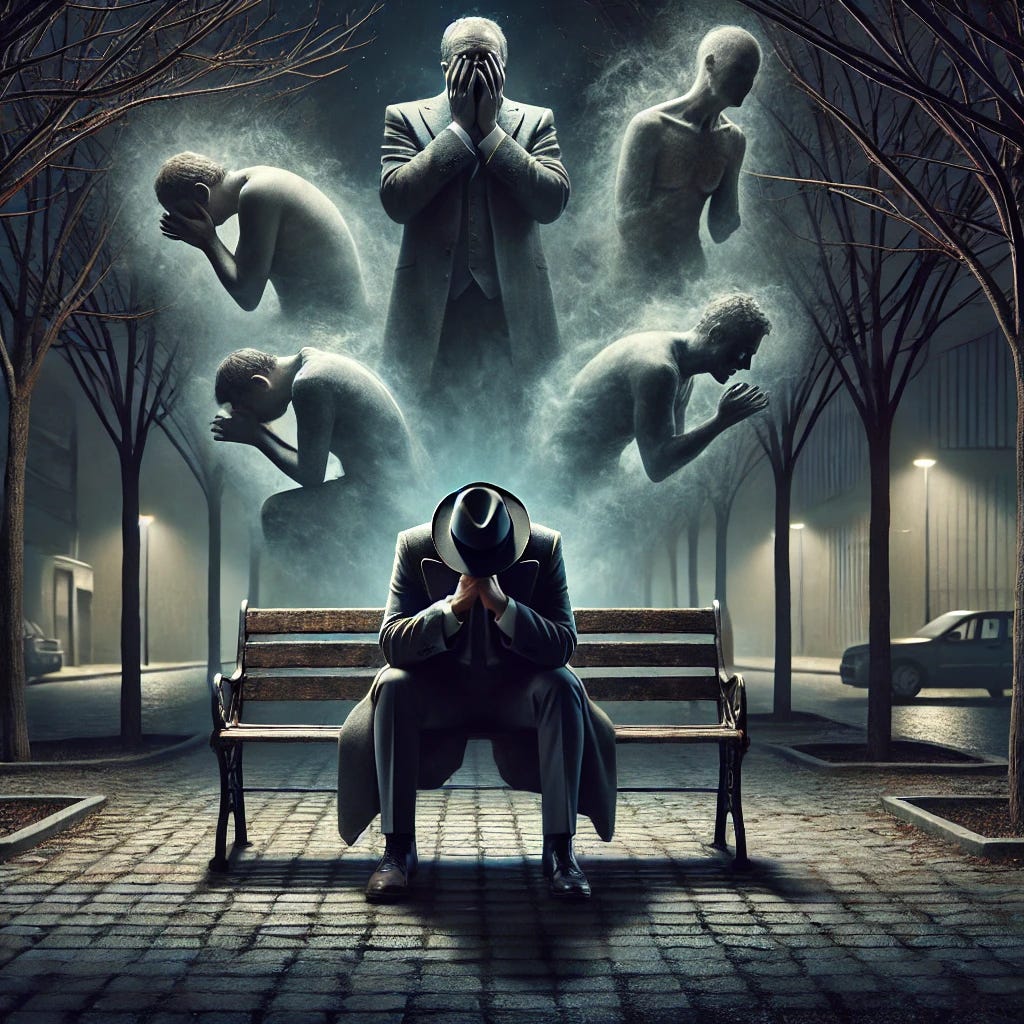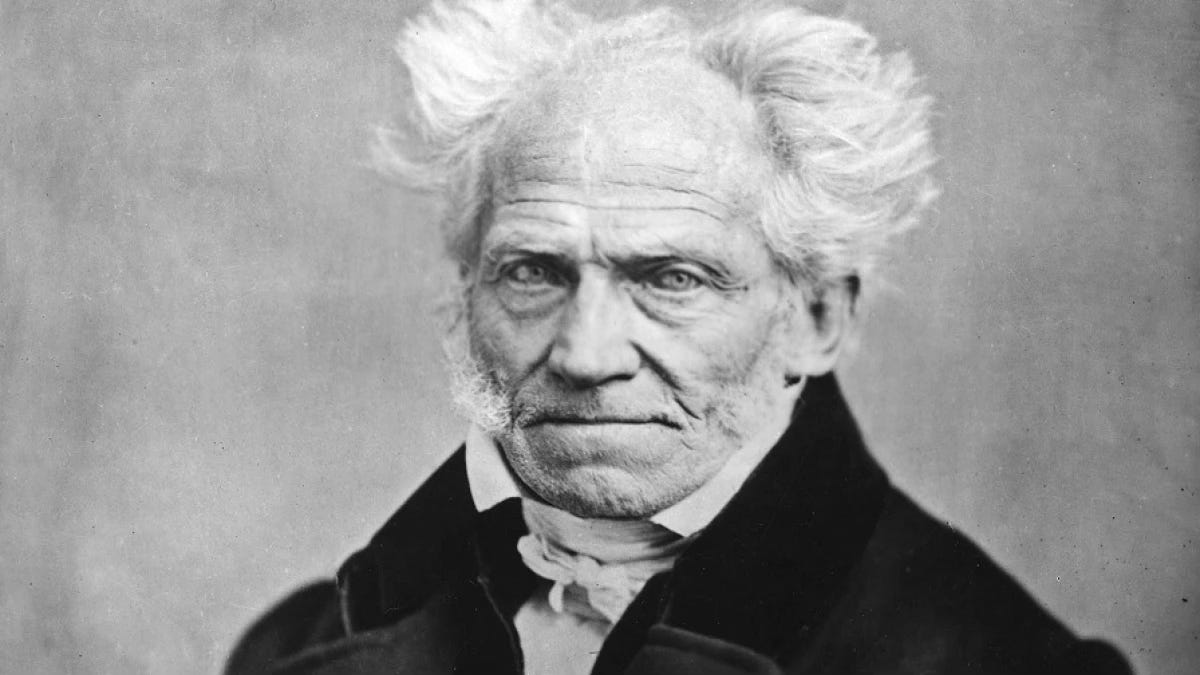What makes a man unhappy is that he wants to be happy. That’s the gut punch Arthur Schopenhauer, philosophy’s eternal bad boy, delivers straight to the face of humanity. It’s raw, it’s brutal, and it stings like hell. But peel back the layers of this hard truth, and you’ll find something more than just despair—a dare to wake up and face life for what it really is.
Schopenhauer doesn’t deal in cheap optimism or feel-good platitudes. No, this guy invites you to rip off the blindfold, stare into the abyss, and figure out how to keep walking. He’s not about solving life’s little problems; he’s about exposing the monstrous truths we avoid, truths that can either crush you or set you free. So, why does life suck so much, and what can we learn from this guy’s unapologetically grim worldview? Buckle up—we’re diving in.
Picture this: it’s 1788, Danzig (modern-day Gdańsk, Poland), a town of cobblestones and chaos, where young Arthur Schopenhauer pops into existence. Born into a wealthy family, he’s got all the trappings of privilege, but life still deals him a rough hand. His dad dies young, his mom’s too busy hosting salons to give a damn, and little Arthur grows up brooding over the futility of it all.
Fast forward to his twenties, and he’s neck-deep in philosophy, chewing through Plato, Kant, and some spicy Eastern texts like Buddhism and Hinduism. This isn’t your average Enlightenment cheerleader. Schopenhauer looks around at all the “progress” and says, “Yeah, that’s great, but you’re still miserable.”
Schopenhauer’s masterpiece, The World as Will and Representation, hits shelves in 1818—and no one cared. The world was too busy gobbling up Hegel’s shiny dialectics to notice Schopenhauer’s brutal takedown of human existence. But here’s the gist: life is powered by an insatiable “will to live,” a blind force that drives us to want, want, and want some more. You reach a goal, and bam—a new desire pops up. It’s a treadmill with no off switch, and happiness? That’s just the brief pause between one craving and the next.
Schopenhauer’s Lessons in Today’s World: A Survival Guide for Modern Chaos
Schopenhauer may have been writing in the early 19th century, but his lessons hit harder than ever in today’s hyperconnected, anxiety-ridden world. Time to break them down and see how they stack up against modern life.
Screw the Crowd
Stop living for likes. In the age of Instagram, TikTok, and the dopamine rush of a “thumbs-up,” Schopenhauer’s advice feels downright revolutionary. Think about the influencers who burn out chasing trends or the average person agonizing over the perfect selfie caption.
Trying deleting the apps for a week. Post nothing. Watch how freeing it feels to not care if your avocado toast gets 100 likes. Instead, focus on what truly brings you joy—maybe it’s reading a book, starting a hobby, or reconnecting with people who love you for you, not your curated feed.
Lean into the Pain
Life hurts, no filter. Modern society teaches us to numb it with distractions—streaming services, scrolling endlessly, or retail therapy. But pain doesn’t vanish; it just festers.
Instead of avoiding a tough conversation with a friend, have it. Confront your fear of failure by submitting that job application you’ve been avoiding. Growth doesn’t happen without friction. Think about athletes—they don’t get stronger by skipping the gym. Pain is the price of progress.
Reality Is a Funhouse Mirror
We all see the world through our own warped lens, shaped by desires, experiences, and algorithms. Social media feeds this distortion by reinforcing echo chambers.
Imagine someone posts a snarky comment on your tweet. You stew over it for hours, convinced they hate you. In reality, they were probably having a bad day, or maybe they didn’t even mean it the way you took it. Schopenhauer’s advice? Step back, question your perspective, and realize that their view isn’t the reality—it’s their reality.
Desire’s a Trap
Think you’ll finally be happy when you get that new iPhone, promotion, or dream vacation? Think again. The minute you get it, you’ll start craving something else.
Remember how thrilled you were with your first smartphone? Now, you probably want the latest model even though the one in your hand works perfectly. Schopenhauer would ask, “Are you buying this because you need it, or because you’re chasing a fleeting high?” Why not practice gratitude for what you already have.
Rediscover Simple Pleasures
In a world obsessed with hustle culture and “bigger is better,” Schopenhauer reminds us that joy often lies in life’s little moments.
During the pandemic, people rediscovered the beauty of baking bread, gardening, or walking outside. These simple activities offered comfort in a chaotic world. You don’t need a yacht or a luxury car to feel alive—try savoring your morning coffee or playing your favorite song. Or just sitting in the garden for fifteen minutes.
Health Is Everything
Schopenhauer said it best: “Nine-tenths of happiness depends on health.” Yet in today’s fast-paced world, health often takes a backseat to deadlines and ambitions.
Think burnout culture. How often do we skip meals, sleep, or exercise to chase success? Schopenhauer’s advice is simple: prioritize your physical and mental well-being. Go for a walk, meditate, or cook a healthy meal. Your career might thank you, but more importantly, you’ll thank you.
The Will Runs the Show
Ever wonder why you keep hitting snooze, binge-watching Netflix instead of finishing that project, or eating junk food despite knowing better? That’s the “will”—the instinctive, irrational force driving your decisions.
Instead of beating yourself up for every bad decision, recognize that you’re human. Schopenhauer’s tip is to bring awareness to these instincts. Build habits that nudge you toward better choices, but don’t obsess over perfection.
Chill Out, Buddha-Style
Schopenhauer vibed with Eastern philosophy, and it’s no surprise why: detachment and acceptance offer freedom. Today’s consumer-driven world thrives on telling you to want more, be more, buy more.
Yet minimalism is having a moment, and for good reason. Declutter your closet, delete unnecessary apps, or say no to obligations that don’t serve you. Learn to let go—not just of stuff but of expectations, grudges, and the need to control everything.
Life Is Art
For Schopenhauer, life wasn’t about avoiding the shadows; it was about weaving them into the masterpiece. Every experience, good or bad, adds depth.
Think of the pandemic—undeniably a dark time. Yet, for many, it also sparked creativity, resilience, and gratitude. Schopenhauer would argue that life’s struggles don’t ruin the painting—they give it contrast. Embrace the mess, and find beauty in the imperfection.
The Schopenhauer Approach
Schopenhauer’s philosophy is an unflinching guide to life in a world that constantly sells us illusions. It’s not about pessimism—it’s about cutting through the noise, facing reality, and finding meaning in the chaos. Whether you’re scrolling social media, navigating heartbreak, or questioning the point of it all, his lessons are a reminder: you’re not here to avoid the dark. You’re here to paint with it.
Schopenhauer doesn’t sugarcoat it: life’s a grind. But his philosophy isn’t about giving up—it’s about showing up. Embrace the chaos, accept the suffering, and find meaning in the madness. Stop chasing illusions of happiness and start living authentically, moment by messy moment.
So, is he a prophet of doom or a misunderstood genius? Maybe both. What’s clear is that his insights, no matter how bleak, force us to think deeper about who we are and how we live.
Let’s get real about what it means to live a meaningful life—Schopenhauer-style. Interesting how something written almost two hundred years ago would be so relevant today.
For more, take a Deep Dive:
On Friday, remembering one of the 60s great recordings, East-West by the Paul Butterfield Blues Band featuring Elvin Bishop and the legendary guitarist, Mike Bloomfield.
Until next time, stay aware, stay curious, and don’t take this wild ride for granted.




No doom here. Sounds like the Buddha. Kerouac: Wake Up
I respect Schopenhauer's viewpoint, especially its nuances. The simplistic view toward Sisyphus is that effort to rise is futile. Another view could say that even if one fails, the aspiration and striving give humanity a certain nobility of vision. A historian could say that progress has happened over centuries, despite relapses. Humanity generally tries to act by the Golden Rule, but frequently fails. In pardoning human failure, one hopes for improvement, even if society continues to punish and imprison the worst actors. That some nations and states have ended torture and capital punishment indicates a desire for human reform and rehabilitation. Perfection (even momentarily) of moral action, as with saints and heroes, happens and can inspire many to emulation. The best criticism of the bad is the practice of the better.